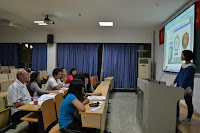 |
| One contestant making her presentation, judging panel in the second row |
 |
| Another contestant's presentation |
These are held each semester to enable students to practice their English and be judged for regional competitions.
My main role was to ask the contestants a question and to present certificates at the end.
 |
| The judging panel |
Although not complex, they were beyond comprehension for most of the students and they struggled through to varying degrees. Only 2 or 3 managed to make a reasonable presentation and again it highlighted for me the difficulty they face in learning English.
The differences are not just in the alphabet and grammar which is vastly different, but also the pronunciation, intonation and speech pattern. Mandarin Chinese is spoken quite quickly and in very short, clipped phrases. Mandarin is spoken in most of China, and Contonese is spoken only in the South-East in Guandong and Hong Kong. The written language is identical, but the spoken language is completely different.
The the same word (they are mostly monosyllabic) can be pronounced at least 3 ways with different intonations to create different meanings. So if the word is written in Pinying (English alphabet), it also needs accent marks (rising, falling or rise-and-fall) so that you know how to pronounce it. This must be done as there is no punctuation in Chinese. Quzhou (衢州) where I’m living is pronounced (Choo-jo) with the ‘jo’ very clipped. Just as we have sounds (like ‘th’) that do not exist in Mandarin, they have sounds that do not exist in the English language.
So, as difficult it is for Chinese people to speak English, it is just as difficult for English speakers to master the intricacies of Mandarin pronunciation.
But back to the competition. The first night, with 50 contestants speaking for 3 mins each took over 3 hours with the presentations at the end.
As a time-filler during the results tabulation, I gave an impromptu presentation using one of the graphs which received a standing ovation. I did have a distinct advantage though, in being a native English speaker. The contestants were pretty hyped, but by the end of the evening I was exhausted.
The second night was for English majors, and thankfully with only 15 contestants so it was much shorter, although the level of English was only marginally better. Following these evenings I will give my classes some training in how to tackle these events in future.
Later in the week I was guest of honour an English Corner evening at the adjacent University. The main purpose is to practice English, but I found that the students were very reluctant to speak, maybe due to shyness, and so it was difficult to draw them out and do much speaking themselves.
I must say that I felt a lot like a travelling curiosity being paraded before an astonished audience. The students themselves were very nice and one with a really fantastic voice sang a song in English at the end of the evening.
In addition to preparation and teaching every day, this made it a very long week.
 |
| My presentation |
 |
| Award winners of the English Speaking Competition |
As a time-filler during the results tabulation, I gave an impromptu presentation using one of the graphs which received a standing ovation. I did have a distinct advantage though, in being a native English speaker. The contestants were pretty hyped, but by the end of the evening I was exhausted.
 |
| Award winners and judges of the English Majors competition |
 |
| The singer at the English Corner evening |
I must say that I felt a lot like a travelling curiosity being paraded before an astonished audience. The students themselves were very nice and one with a really fantastic voice sang a song in English at the end of the evening.
In addition to preparation and teaching every day, this made it a very long week.
